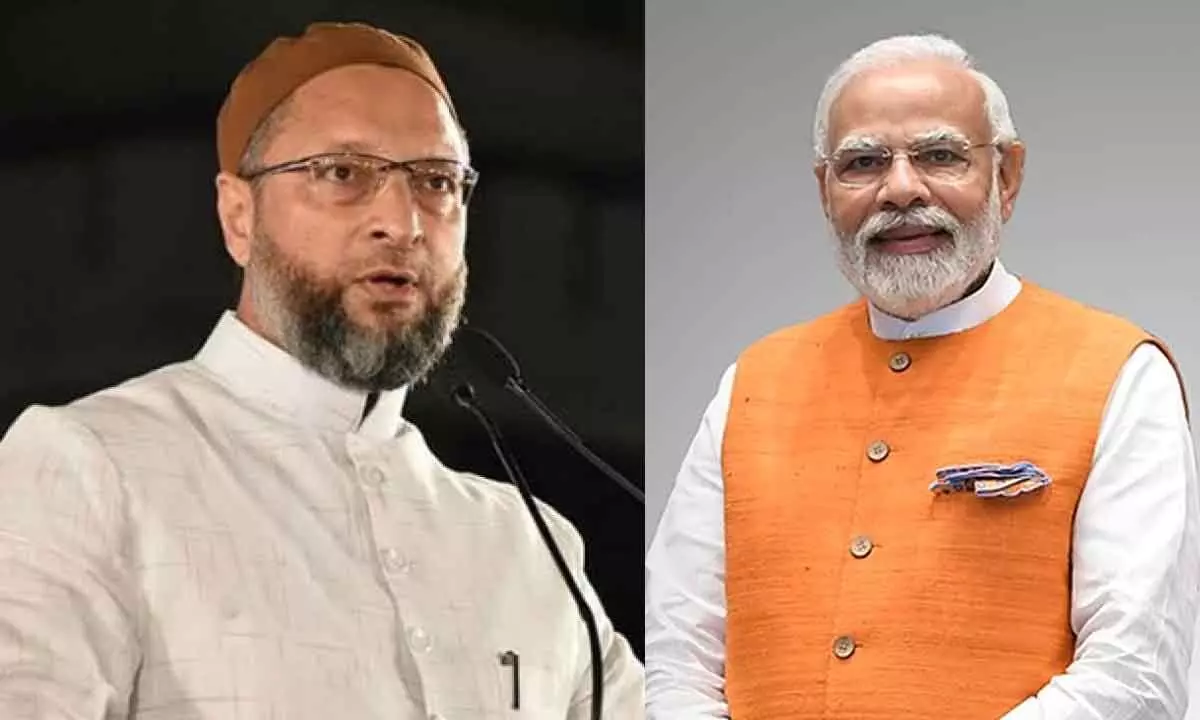Live
- Odisha BJP chief to be elected in January
- AP Home Minister Anitha alerts officials amid rains in heavy Rains in Tirupati
- Taluk Guarantee panel
- Uber Launches Uber Moto Women for Safer and Flexible Rides in Bengaluru
- ‘Fear’ pre-release event creates waves
- Champions Trophy 2025 Host Change? Indian Broadcaster's Promo Sparks Controversy
- Nabha Natesh introduced as Sundara Valli from ‘Swayambhu’
- Aamir Khan praises Upendra's ‘UI: The Movie’ ahead of its release
- Celebrations: Keerthy Suresh ties the knot with Antony Thattil
- Indian scientists develop flexible near-infrared devices for wearable sensors
Just In
Owaisi pens a letter to PM Modi urging to defend the Places of Worship


AIMIM president Asaduddin Owaisi; Prime Minister Narendra Modi
- Owaisi writes letter in the wake of the hearing in the Supreme Court of a petition challenging the constitutionality of the Act
- Says it is a general duty of the executive to defend the constitutionality of parliamentary legislation
Hyderabad: The AIMIM president Asaduddin Owaisi has urged the Prime Minister Narendra Modi to defend the Places of Worship (Special Provisions) Act, 1991 before the Supreme Court. In a letter to the Prime Minister, the Hyderabad MP said he should defend the Act as it upholds India's diversity.
Owaisi wrote the letter in the wake of the hearing in the Supreme Court of a petition challenging the constitutionality of the Act. The Apex Court has sought the Central government's stand on the legislation.
The MP wrote that it is a general duty of the executive to defend the constitutionality of parliamentary legislation.
Wrote to @PMOIndia regarding Places of Worship Act, 1991. #SupremeCourt is hearing a challenge to its constitutionality & has sought Union govt's stand. SC had held that the Act enforced basic structure of the constitution. PM must defend the Act as it upholds India's diversity pic.twitter.com/B9oZPpyNxO
— Asaduddin Owaisi (@asadowaisi) October 19, 2022
He pointed out that the Act was enacted to protect the character of places of worship as they stood on August 15, 1947.
The primary purpose behind such a provision was to protect the diversity and pluralism in India. This was to ensure that independent India did not suffer from religious disputes that cause perpetual divisions in society. This was clearly a reflection of the values of India's freedom struggle, he said.
"When this law was introduced in Parliament, it was rightly stated to be a measure necessary to avoid controversies that arise from time to time regarding conversion of places of worship which tend to vitiate the communal atmosphere. It was enacted as a law with the hope that it would heal the wounds of the past and help restore communal amity and goodwill," reads the letter.
Owaisi recalled that while deciding the Babri Masjid dispute, the Supreme Court had stated that by enacting the 1991 Act, the state had enforced the constitutional commitment and operationalised its constitutional obligation to uphold the principle of secularism, which is part of the basic structure of the Constitution.
"While Parliament intended the Act as a measure to preserve communal harmony and peace, the Supreme Court considered it to be an affirmation of the solemn duty which was cast upon the State to preserve and protect the equality of all faiths as an essential constitutional value, a norm which has the status of being basic feature of the Constitution."
Owaisi further urged the Prime Minister not to let the executive take any view which deviates from the true spirit of constitutionalism as reflected in the Supreme Court judgment as well as in the aims and objects of the legislation.
The MP said the Apex Court found that the concept of 'constitutional morality' is embedded in our constitutional system, adding that it is the basic rule which prevents institutions from turning tyrannical, warns against the fallibility of individuals in a democracy, checks State power and safeguards minorities from the tyranny of the majority.
"This is now being put to test. I hope that the executive headed by you will act to uphold the ideal of constitutional morality and defend the Act of 1991.
"The Act represents the idea that one cannot endlessly litigate against history. That modern India cannot be the battleground of resolving medieval disputes. It puts an end to unnecessary religious disputes and protects India's religious diversity. Therefore, I urge you to defend the sanctity of this solemn legislation," he added.

© 2024 Hyderabad Media House Limited/The Hans India. All rights reserved. Powered by hocalwire.com






